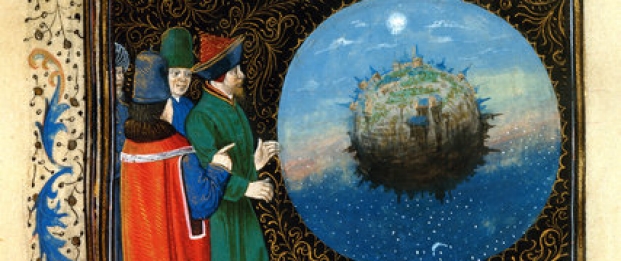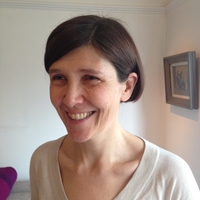
Exploring Medieval & Renaissance Studies
MRS 3023
Joyce Coleman, Department of English
MRS 3023 provides an overview of the history, literature, art, and music of the Middle Ages and Renaissance, including hands-on work with medieval manuscripts and early printed books. This course will be taught by a series of OU faculty lecturing in their area of expertise, coordinated by a faculty member who will be present at every class and will serve as instructor of record. As a Presidential Dream Course, we will also be bringing in guest speakers and holding associated events, to all of which the students will be invited. The course has been approved for general-education credit and can be used for major credit in English, History, and History of Science.
The goal of the course is to equip students with a broad general knowledge of the foundation of European culture, as well as to develop skills in writing and in the critical evaluation of primary and secondary sources. The course can serve as an introduction to Medieval and Renaissance Studies for students who wish to go on to take more specialized courses in the art, literature, music, science, religion, or politics of the period. It can also serve as a stand-alone humanities course that will acquaint students with the origins of many features of modern western society (including books, banks, science, universities, and the English language), as well as fostering skills in research and writing.
The instructor of record will be Prof. Joyce Coleman, of the English Dept. Four other OU professors will serve as “core faculty members”: Kathleen Crowther and Rienk Vermij of the History of Science Dept.; Roberta Magnusson of the History Dept.; and Jennifer Saltzstein of the Musicology Dept. These individuals will be teaching several classes each, will attend the “synthesis / discussion” days at the end of each of the four units, and will be acting as graders and advisers in their fields. Other OU professors will visit the class for one or two lectures. Three “unit-papers” and a final paper will provide a chance for students to achieve depth by focusing on particular areas of interest. We have thought carefully about how to balance the stimulating variety of lecturers with continuity and coherence in the students’ experience of the class, and how to ensure fairness in grading.
Public Lecture Series
The Department of English presents a public lecture series in conjunction with the Presidential Dream Course. Presentations are free and open to the public. For information or accommodation to events on the basis of disability, contact Joyce Coleman, joyce.coleman@ou.edu.
Medieval Monsters and Maps

Thursday, September 14, 2017
6:30pm - 8:00pm
Regents Room, Memorial Student Union
View Lecture Flyer [PDF]
Jane Gilbert
Senior Lecturer, Department of French, University College London
Jane Gilbert is Senior Lecturer in French at University College London, England. She is a specialist in medieval French and English literature, and in modern critical theory. She was a co-investigator on the digital humanities project, Medieval Francophone Literature Outside France, www.medievalfrancohone.ac.uk, which was funded by the Arts and Humanities Research Council of Great Britain. She is especially interested in how the strange qualities and practices of the Middle Ages can throw light on the strangeness of today’s.
Plague, Ecology, and Empire: Re-thinking the Black Death Pandemic

Thursday, September 21, 2017
6:30pm - 8:00pm
Regents Room, Memorial Student Union
View Lecture Flyer [PDF]
Nükhet Varlık
Associate Professor, Rutgers University, Newark
Dr. Varlık is a historian of the Ottoman Empire with a keen interest in disease, medicine and other traditions of healing, and public health. Her first book, Plague and Empire in the Early Modern Mediterranean World: The Ottoman Experience, 1347-1600 (Cambridge University Press, 2015) explores the historical connections between the growth of the Ottoman power in the Mediterranean world and the simultaneous expansion of plague. The book won two prestigious awards in 2016: the Hourani Award and the Koprulu Prize. Dr. Varlık is currently working on a new book project tentatively titled The Ottoman Healing Arts: Healers, Patients and the State in the Early Modern Era, which explores the role of the Ottoman state in the transformations of healing traditions and the professionalization of healers in the early modern era.
Putting Dinner on the Table in Chaucer’s London

Thursday, October 12, 2017
6:30pm - 8:00pm
Regents Room, Memorial Student Union
View Lecture Flyer [PDF]
Martha Carlin
Professor, University of Wisconsin, Milwaukee
Prof. Martha Carlin is Professor of History at the University of Wisconsin, Milwaukee. Her research focuses on medieval social and economic history, especially urban life, correspondence, food, shopping, and taverns. Prof. Carlin has helped illuminate the daily life of medieval London, with close studies of particular areas of the city, the way people communicated, the food they ate, the kinds of places they hung out in. Her close documentary research has led to several discoveries of importance to literary scholars as well. The Times Literary Supplement published her recent discovery that Shakespeare himself had visited, and carved his name into the wall of, the Tabard Inn, which is also where Chaucer had his pilgrims meet before setting out to Canterbury. She has also uncovered important facts about Chaucer and his contemporary, John Gower.
Engineering the Eternal City: Infrastructure, Topography, and the Culture of Knowledge in Late Sixteenth-Century Rome

Thursday, November 16, 2017
6:30pm - 8:00pm
Frontier Room, Memorial Student Union
View Lecture Flyer [PDF]
Pamela Long
Independent scholar
Dr. Pamela Long is an independent scholar based in Washington, D.C. She is a historian of early modern European cultural history and the history of science and technology. After her B.A., she worked for seven years as a social worker, then returned to history and received her Ph.D. in pre-modern European history. She has written extensively on communication between artisans and learned individuals in sixteenth-century Europe and the influence of such relationships on the development of the “new sciences.” She has also written on the history of early technology and material culture, and is at work on a book about engineering in late sixteenth-century Rome. She was the recipient of a MacArthur Fellowship in 2014.

